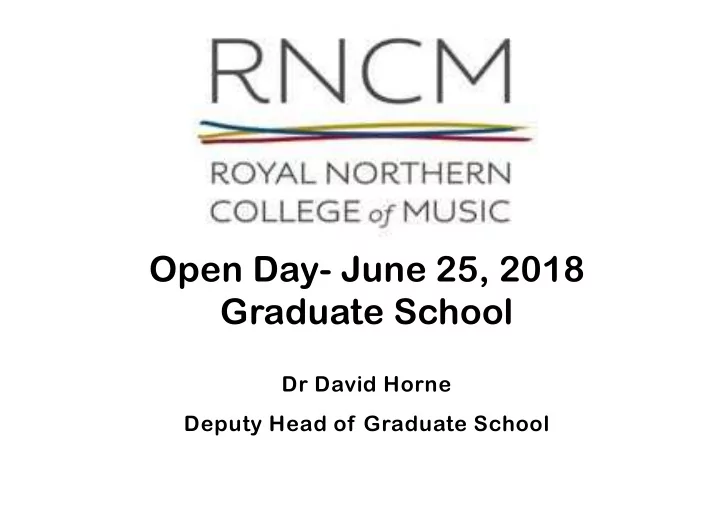

Open Day- June 25, 2018 Graduate School Dr David Horne Deputy Head of Graduate School
Two-year MMus 180 credits Year 1 Core Principal Study ( 60 credits at Level 6) + 2 Modules 30 credits Year 2 Core Principal Study 60 credits + Repertoire Research 30 credits + 1 Module 30 credits
One-year MMus 180 credits Core Principal Study 60 credits + Repertoire Research 30 credits + 3 additional Modules 3 x 30 credits
PGDipAS (one year) 120 credits Core Principal Study 60 credits + 2 Modules 2 x 30 credits
Performance/Composition Assessment 60 credits � traditional � concert recital (A) OR major opera role / concerto performance (B) OR mixed diet (A & B)
Repertoire Research (2 nd year on 2-year MMus) Instrumental Vocal Contemporary music (singers/ instrumentalists) Popular Music
Optional modules
Options Performing Arts Leadership: Creative Learning in the Classroom Nigel Mainard <boing@artiseducation.com>
Options Accompaniment Dr David Jones david.jones@rncm.ac.uk
Options Arrangement Prof Adam Gorb adam.gorb@rncm.ac.uk
Options Aural Analysis and Critique mauricio.pauly@rncm.ac.uk
Options Composition Elective Prof Adam Gorb adam.gorb@rncm.ac.uk
Options Conducting Elective Mark Heron mark.heron@rncm.ac.uk Auditions: Friday 29 September
Options Contemporary Songwriting rodrigo.constanzo@rncm.ac.uk
Options Electric Experimental Ensemble mauricio.pauly@rncm.ac.uk
Options Dalcroze Eurhythmics karin.greenhead@rncm.ac.uk
Options Dalcroze in Context Dr John Habron john.habron@rncm.ac.uk
Options Freelance Musician Dr Adam Swayne Adam.Swayne@rncm.ac.uk
Options Lecture Recital Dr David Horne david.horne@rncm.ac.uk
Options Musicianship for Instrumentalists Dr Simon Parkin Simon.Parkin@rncm.ac.uk
Options Musicianship for Vocalists: Consort Singing Prof Lynne Dawson Lynne.Dawson@rncm.ac.uk
Options (MMus only) Performing Research: Methods in Music Psychology and Music Education Prof Jane Ginsborg jane.ginsborg@rncm.ac.uk Dr John Habron John.habron@rncm.ac.uk
Options Practical Pedagogy Dr John Habron john.harbron@rncm.ac.uk
Options Professional Audition lynne.dawson@rncm.ac.uk
Options Professional Placement hannah.mccabe@rncm.ac.uk
Options Small Ensemble Performance (Chamber Music, Jazz, Historically Informed Performance) Jeremy Young jeremy.young@rncm.ac.uk
Options Major or Minor Project ( 30/60 credits ) in Musicology Music Education Music Psychology
Options (PGDipAS) Major or Minor Project ( 30/60 credits ) in Creative Project
Non-credit module Introduction to Music Theory for Postgraduate Students david.horne@rncm.ac.uk
Revalidation (2019- )
Practically-oriented modules Accompaniment Arrangement Aural Analysis and Critique Composition Elective Conducting Elective Contemporary Songwriting Dalcroze Eurhythmics and Dynamic Rehearsal Electronic Experimental Ensemble Freelance Musician and Entrepreneurship Musicianship for Instrumentalists Musicianship for Vocalists: Consort Singing Practical Pedagogy Professional Placement Small Ensemble Performance
Research-oriented modules Dalcroze in Context Lecture Recital Performing Research: Methods in Music Psychology or Music Education Performing Arts Leadership: Creative Learning in the Classroom Final performance/portfolio research (new module, formerly Repertoire Research) Research Methods in Artistic Research (new module) Research Methods in Musicology (new module) Research Project (new module, formerly Minor Project)
Strands (‘minors’) Artistic Research Contemporary Music Performance Entrepreneurship Musicology Music Psychology Music Education Popular Music (Applied Practice) Require 90 credits in particular strand
Practically-oriented modules Accompaniment Arrangement Aural Analysis and Critique (PM) Composition Elective Conducting Elective Contemporary Songwriting (PM) Dalcroze Eurhythmics and Dynamic Rehearsal Electronic Experimental Ensemble (C, PM) Freelance Musician and Entrepreneurship (E) Musicianship for Instrumentalists Musicianship for Vocalists: Consort Singing Practical Pedagogy (ME) Professional Audition (currently offered only in APGDip programme) Professional Placement (C, E) Recording project (R only) Small Ensemble Performance
Research-oriented modules Dalcroze in Context (ME) Dissertation (minor/major) Performing Research: Methods in Music Psychology or Music Education (ME/MP) Performing Arts Leadership: Creative Learning in the Classroom (ME) Repertoire Studies (R only) Research Lecture Recital (formerly Lecture Recital) (A, C) Research Methods in Artistic Research (new module) (A) Research Methods in Musicology (new module) (M) Research Project (new module, formerly Repertoire Research)
Programme aims: 1 Provide students with highly specialised musical training to a professional level in performance, composition, or conducting 2 Equip students with a breadth and depth of musical experience and a comprehensive understanding of the techniques and the most recent innovations applicable to their chosen discipline to enable them to enter the profession as mature, reflective, confident, entrepreneurial and creative practitioners 3 Provide a flexible scheme of modules incorporating enquiry-based critical learning and self-directed initiatives appropriate to the needs and career aspirations of the individual, which complement studies in performance/composition/conducting 4 Provide the framework to enable students to master complex and specialised research-based work to inform principal study activity, employing advanced skills and critical enquiry to conduct significant and innovative practice-led research within their disciplines 5 Offer access, at a highly specialised level, to the RNCM’s programme of corporate performance activities, including Chamber Music, and opportunities to work with professional partners tailored to the student’s needs, in order to foster independent learning and to continue to advance their professional development and employability 6 Equip students with the broadest possible range of transferable skills necessary for employment, including knowledge of the music profession, self-promotion, exercising initiative, personal responsibility, creative risk-taking, appropriate communication skills in a range of formats and fora (including IT), complex decision-making, fostered through learning both independently and in collaboration with tutors and peers, thus establishing a basis for continuing professional development
Recommend
More recommend